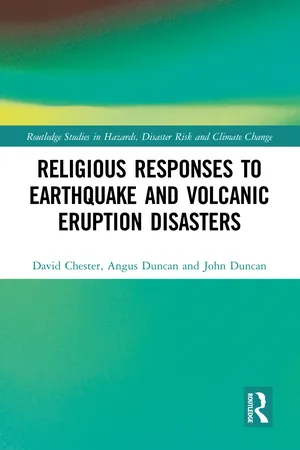
Religious Responses to Earthquake and Volcanic Eruption Disasters
- 240 pages
- English
- ePUB (mobile friendly)
- Only available on web
Religious Responses to Earthquake and Volcanic Eruption Disasters
About This Book
This book argues that, although secular and religious perspectives on disasters have often conflicted, today there are grounds for believing that the world's major faiths have much to contribute to the processes of post-disaster recovery and future disaster risk reduction (DRR).
It seeks to demonstrate how contemporary dialogues between theologians, disaster scholars and policymakers are defining new ways of working together. These explore how the resources of religious communities, e.g. buildings, human resources and finance, may be used to foster successful policies of DRR, particularly in the aftermath of earthquakes and volcanic eruptions. Musing on the relationships between religion and disasters has occurred for millennia and has affected many societies worldwide. In societies where the world's major religions – Buddhism, Christianity, Hinduism, Islam, Judaism and Shinto – have been and remain dominant, attempting to find supernatural explanations for disasters has occurred throughout history and there have been many theologies seeking to explain why people suffer losses. It is argued that developments both within these traditions of faith and in how disasters are understood by the hazard research community of researchers and planners have allowed a new modus vivendi to emerge which emphasises both a recognition of religious worldviews by academic writers and disaster planners on the one hand, and a desire by people of faith and their leaders to be more fully committed to the goals of DRR.
The book will appeal to those who are interested in the interface between disasters and theology across the principal religions of the world. This includes researchers and students in geology, geography, theology and religious studies. It will also be useful for specialist academic audience and the educated general reader.
Frequently asked questions
Information
Table of contents
- Cover
- Half Title
- Series Page
- Title Page
- Copyright Page
- Contents
- List of Figures
- List of Tables
- Preface
- 1 Where Is God in This? Pre-Historic and Historic Relationships between Religion and Disasters
- 2 A Paradigm Shift in Disaster Studies
- 3 Judaism, Christianity and Disasters
- 4 Islamic Understandings
- 5 Disaster Losses and Suffering: Buddhist, Hindu and Shinto Perspectives
- 6 Religion and the Policies of Disaster Risk Reduction
- Index